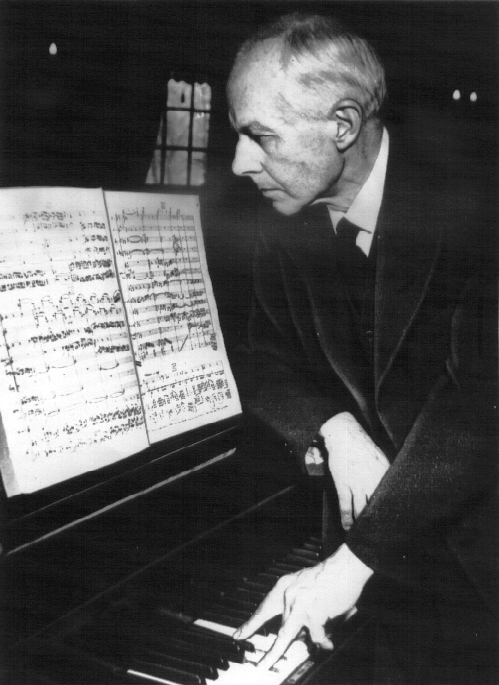” Ho composto per coro a cappella, perché volevo che questo atto di fede fosse eseguito senza l’aiuto strumentale, con il solo mezzo della voce umana
Description by Jeremy Grimshaw
Poulenc‘s cantata for double mixed a cappella choir, Figure humaine, is among his most important and highly regarded works. The eight poems that comprise the cantata are among the 29 by Paul Eluard that Poulenc would set during his career. These texts have a special significance, however: they were smuggled to Poulenc under pseudonyms; Eluard stayed underground to avoid imprisonment for his support of the French resistance. Likewise, the musical score had to be smuggled out of France for the first performance, which took place in London, on March 25, 1945. Thus, the themes of death, war, oppression and liberty that fill the pages of the work have a deeply personal resonance, for both Eluard and Poulenc, as well as for all of Nazi-occupied France. Indeed, the composer intended Figure humaine to be an anthem: “I composed the work for unaccompanied choir because I wanted this act of faith to be performed without instrumental aid, by the sole means of the human voice.”
Poulenc, who worked with several poets, was particular;y close to Eluard, and their collaborations created an extraordinary artistic synergy. Singer Pierre Barnac, who worked closely with Poulenc in several early performances and knew the Eluard/Poulenc songs intimately, wrote in The Interpretation of French Art Song that “Poulenc succeeds in clarifying the poems by his music, divining their correct movement, their punctuation, their breaths, their inflections; he catches their feeling, their emotion, often revealing their deepest and most hidden meaning, and giving them life.” Eluard himself stated it even more succinctly, in an ode to Poulenc penned in 1944: “Francis je ne m’écoutais pas / Francis je te dois de m’entendre” (“Francis, I didn’t listen to myself / Francis, you made me hear myself”).
Eluard‘s poems are variously pessimistic, despairing, grotesque, and cynical, but ultimately patriotic. The opening line of the first poem paints a grim picture: “Of all the springtimes in the world, this is the most ugly of all.” Poulenc sets the first poem in somber homophony; only occasionally imitative or cumulative textures. His double-choir scoring, each of them consisting of six lines, allows for subtle antiphonal nuance as well as a rich tutti sonority. As one might expect from Poulenc, the dramatic contour of the song is shaped by a distinctive harmonic fluidity that supplants explicit thematic developments.
Elsewhere, Poulenc approaches scoring and harmony quite differently, according to his reading of Eluard‘s text. “Toi ma patiente,” for example, features the first choir only, and introduces certain textural effects not heard before in the cycle. The piece is built upon alternating patterns of harmonic stasis and disturbance. The moments of stillness are maintained by a gesture that continually descends from and returns to the same chord tones, in roughly parallel motion in all voices — except for a sustained fifth scale degree that sounds from within the middle of the ensemble.
Perhaps the most striking dramatic effect is to be found in the second song, “Le rôle des femmes,” which describes the gruesome scene of women singing on their way to clean up the killing fields — which Eluard describes as “the final toilet of mortality.” Poulenc exercises a bit of poetic license, darkening the picture even further by giving voice to the maiden’s singing: some sing “la la la… ” as others declaim Eluard‘s text. The work ends on a much more optimistic note, however. Eluard‘s speaker describes all the places where a certain name is metaphorically written; throughout the texture, Poulenc weaves the phrase “I write your name…. ” The work ends as the word is triumphantly revealed with a broad, ffff cadence: “Liberté!”
Parts/Movements
- De tous les printemps du monde
- En chantant les servantes s’élancent
- Aussi bas que le silence
- Toi ma patiente ma patience ma parente
- Riant du ciel et des planètes
- Le jour m’étonne et la nuit me fait peur
- La menace sous le ciel rouge
- Liberté
http://www.allmusic.com/composition/figure-humaine-cantata-for-12-voices-fp-120-mc0002356039
Francis Poulenc, Les Biches – Les Animaux modèles
http://www.controappuntoblog.org/2013/08/11/francis-poulenc-les-biches-les-animaux-modeles/

